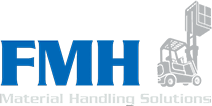The Ins & Outs of Lithium-Ion Forklift Batteries
When you think "electric forklift," what kind of battery do you think of?
Chances are you'd think of something like this:
- A big, heavy lead-acid battery,
- that needs regular watering,
- has a long charge time,
- is extremely heavy,
- contains dangerous chemicals,
- and emits toxic fumes.
There's a better option. The lithium-ion battery is none of these things.
The Qualities of Lithium-Ion Forklift Batteries

Battery Safety. Older electric forklift batteries required maintenance. Battery watering, regular charging, cable inspections, etc. Even with maintenance, they presented some safety challenges.
Long shifts would sometimes require a battery swap – lifting one battery out of the forklift, and replacing it with a fully-charged battery, so the forklift could continue operating while the original battery charges.
Lead-acid batteries also off-gas. They emit slight fumes during the workday that, over time, can lead to health issues. Proper venting in facilities can help with off-gassing, but it's still a concern.
A lithium-ion battery does not off-gas. Nor do you need to do battery swaps to maintain forklift productivity. Newer models don't even need watering. So you have a safer battery in every respect.

Cost. Yes, lithium-ion forklifts will on average cost more up front than a lead-acid electric truck. However, when you look at TCO (total cost of ownership), lithium-ion actually beats lead-acid.
A recent article in Material Handling Wholesaler pointed out how lithium ion batteries save money on charging:
"Lithium-ion batteries reduce electrical costs due to a better charger efficiency, say 97 percent vs. roughly 75-80 percent for lead-acid. That is at least a 15 percent reduction in your electrical expenses allocated to battery charging."
(Source: MHWMag.com )

Charging Efficiency. With lead-acid, you need to charge overnight to get a full shift out of the forklift the next day. With a lithium-ion battery, you don't have to charge nearly that long. In some models, the battery only needs a 2-hour charge to get back to full.

Lithium Reliability. With this "opportunity charging" option, you can run lithium-ion forklifts far longer than you can a lead-acid electric. It's not uncommon to run lithium-ion trucks 24 hours a day, 7 days a week, with no major stops or battery swaps.
Heli Forklifts with Lithium-Ion Batteries: A Visual
Let's give a visual for all of the lithium-ion advantages. This is the Heli CPD20SQ:

It comes with 4000lbs. load capacity and a 10mph travel speed, loaded or unloaded. Lithium-ion Heli forklifts like this give you:
- Zero-emission operations
- No need for watering
- Cold-weather operation with no power drain or jerking
- A 2-hour quick charge for a full shift
- Safe batteries for continuous use
- No need to battery swap
- 480V / 3 phase charger
- Same (or better) carrying capacity
Lithium-Ion Brings Better Performance
Saving money on total forklift cost, while reducing operating expenses at the same time? As we've seen here, you can have both.
Lithium-ion is now a mature battery technology. You'll find it in forklifts from Heli, as well as several other popular brands. Ask your FMH rep to test one out.
Supply Your Electrics with Lithium-Ion Batteries from Rocky Mountain Battery
Looking for lithium-ion forklift batteries? Call your nearest RMB to find the correct battery for your truck. We also carry chargers, do battery swaps, and maintain batteries for all forklift types.
Find your local Rocky Mountain Battery office at RMBattery.com.
